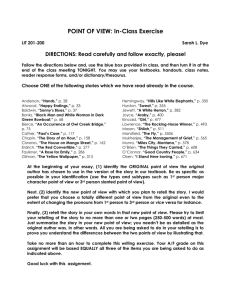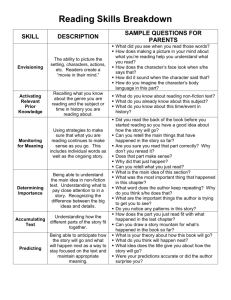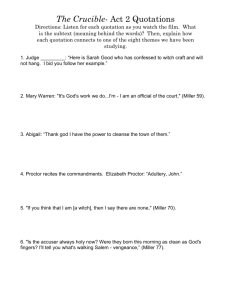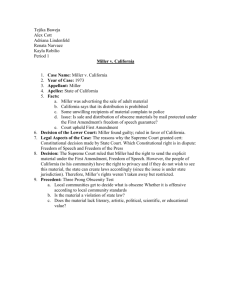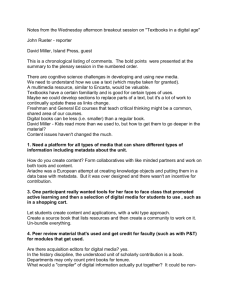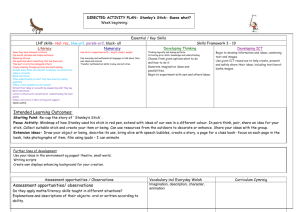Gathering Narrative Retell Samples Using Frog, Where Are You?
advertisement
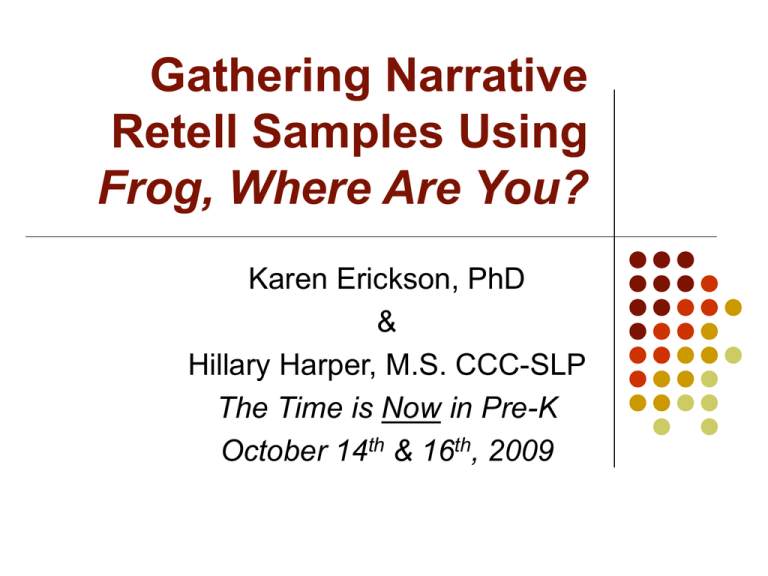
Gathering Narrative Retell Samples Using Frog, Where Are You? Karen Erickson, PhD & Hillary Harper, M.S. CCC-SLP The Time is Now in Pre-K October 14th & 16th, 2009 Why Language Samples? Everyday communication context, naturalistic Language sample analysis (LSA) used in the majority of studies of language production in children Provided the details of developing language Developmentally sensitive Children produce samples of increasing complexity through childhood and beyond (Miller & Nockerts, 2009) LSA Strengths Can be used with anyone who is able to produce some language Provides measures of language use in context Allows multiple analyses of the same sample at the word, morpheme, syntax, semantic and discourse levels Aids in identifying language disorders among Students with developmental disabilities English language learners Dialect speakers (Miller & Nockerts, 2009) Types of Language Samples Conversation Narration Questions asked and answered between communication partners Social responsiveness, discourse Retelling an event, experience, story, movie, or TV drama Structure: title, scene, characters, conflicts, mental states, resolution, ending Organization, beginning, middle, end, coherence, referencing, listener perspective Exposition Explain how to play a game or do something (Miller & Nockerts, 2009) Eliciting Narratives: Materials You will need: copy of the book Frog, Where Are You? by Mercer Mayer (1969). script or audio file of Frog, Where Are You? quiet location free of distractions with a table and two chairs. Means for recording student’s language sample (flip camera, cassette tape, etc.) (Miller & Nockerts, 2009) Eliciting Narratives: Preparation Select a quiet area where student’s voice can be heard on recording Check the recorder for loudness levels. Record your name, date, student's name, birth date, age and grade. (Miller & Nockerts, 2009) Eliciting Narratives: Directions Seat the student next to you. Say: “I would like to find out how you tell stories. First, I am going to tell you a story while we follow along in the book. When I have finished telling you the story, it will be your turn to tell the story using the same book.” Tell (don’t read) the story to the student, loosely following the script (provided on the next page). You do not need to memorize the story script, just become familiar enough with it to tell a similar story. (Miller & Nockerts, 2009) Eliciting Narratives: Directions After telling the story or playing the audio, prepare the flip camera/tape recorder to record the student’s sample and say “Now I would like you to use your own words to tell the story.” Turn the book to the first page with pictures and start recording. Say “Do the best that you can do. Now you tell me the story.” (Miller & Nockerts, 2009) Adult’s Role During Retell During the retell, move slightly away from the student, turning so that eye contact is easy. The student should be in charge of page turning during the retell Provide assistance if the student has trouble turning pages or starts skipping too many pages. (Miller & Nockerts, 2009) Adult’s Role During Retell Remember…do not give specific cues to the student during the task To focus student’s attention on the book or to encourage student to keep talking can say: “Tell me more” “Keep going” “You are doing a great job” “And then…” Use open-ended prompts rather than “wh” questions (Miller & Nockerts, 2009) Flip Cameras Basic Skills Checklist: Turn it on/off Record Delete Note time remaining on memory card Questions???? Frog, Where Are You? With a partner take turns as the “adult” and “child” to elicit narratives Adult role: Read through the Frog, Where Are You? transcript and videotape “child” retelling the story. Child role: Listen as you are told the story and then retell it in your own words. Frog, Where Are You? Reflecting… Easiest aspect? Most challenging aspect? Which portion will you need to practice more? For which students do you think language sampling will be the most informative? References Systematic Analysis of Language Transcripts (2009). Narrative Story Retell Reference Database. Retrieved on October 12, 2009 from http://www.saltsoftware.com/salt/downloads/ NarStoryRetellRDBDoc.pdf .
